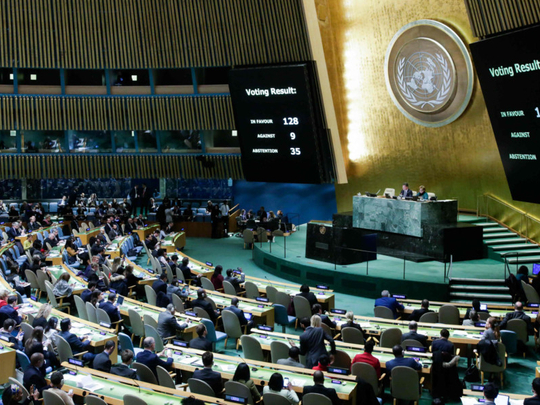
‘Strong, sovereign nations let diverse countries with different values, different cultures and different dreams not just coexist but work side by side on the basis of mutual respect,” United States President Donald Trump had said in his first speech to the United Nations General Assembly, in September, drawing sighs of relief. Three months later, those same diverse nations were warned by the US president’s UN ambassador, Nikki Haley, that she would take their names if they failed at the UN to support the US decision to move its embassy to occupied Jerusalem and recognise the city as the capital of Israel. The era of mutual respect was short-lived.
Haley’s implicit threat was that countries that defied the US president would face consequences. A few hours later, Trump made explicit what is implicit in his “America First” diplomacy: If the UN voted against the US, he forecast that the US would “save a lot”.
It is partly because he is a product of a mindset that has long seen the UN as a hotbed of anti-Americanism, corruption and waste, best set out in the Fox News correspondent Eric Shawn’s book The UN Exposed. In the words of John Bolton, the US ambassador to the UN in the administration of former US president George W. Bush, the UN has always represented “a target-rich environment” — especially due to its perceived anti-Israel bias. It can also be argued that Trump’s bullying only brought to light a constant feature of hard-power diplomacy at the UN. A repeated resort to the veto by a permanent UN Security Council member — as has been the case with Russia over Syria — is normally a sign that a country’s diplomacy is misfiring. But there has been something qualitatively different about the US treatment of fellow member-states over occupied Jerusalem. The line of attack was so populist, so redolent of a protection racket, that it can only be aimed at a domestic audience rather than an external one. As countless diplomats have warned in the past 24 hours, it will also be counterproductive, only deepening US isolation.
Despite the warnings, the UN General Assembly voted by a huge majority to reject Trump’s unilateral recognition of occupied Jerusalem as Israel’s capital on Thursday, with Canada reportedly switching from supporting the US to abstaining in protest at the attempt to strong-arm states. Even before the vote, Bolivia’s UN ambassador, Sacha Llorenty, advised Haley that the first name she should write down in her black book was Bolivia. For many countries, it will be a badge of honour to have defied a super power. Countries normally close to the US had to take a discreet step away. They had their own courts of public opinion. When the roll call was taken, only nine countries — most with populations counted in the tens of thousands — backed the superpower. Haley’s notebook was filled with the names of 128 countries that had ignored her threats.
Yet, this could turn into an expensive symbolic clash for the UN as a whole. In 2016, the US remained the largest donor to the United Nations, contributing more than $10 billion (Dh36.78 billion) — roughly one-fifth of its collective budget. Of this, $6 billion was voluntary and $4 billion assessed. The US gives $2.4 billion to UN peacekeeping operations alone. In addition, according to figures from the US government’s aid agency, USAID, in 2016, the US provided $13 billion in economic and military assistance to countries in sub-Saharan Africa and $1.6 billion to states in east Asia and Oceania. It provided $13 billion to countries in the Middle East and North Africa, $6.7 billion to countries in south and central Asia, $1.5 billion to states in Europe and Eurasia and $2.2 billion to western hemisphere countries, according to USAID.
The danger is that Trump’s ire could spiral out of control, causing long-term damage to the UN and to the reform programme of its Secretary-General, Antonio Guterres. The US has already pulled out of Unesco, and last week, the UN High Commissioner for Human Rights, Zeid Ra’ad Al Hussain, announced that he was not seeking a second term, saying he would not bend the knee to the US.
Still worse, Trump’s bullying of the UN may obscure the seriousness of the issue at hand. Moving the US embassy to occupied Jerusalem is not some real-estate decision. Recognising occupied Jerusalem as the capital of Israel challenges the peace process, discomforts Saudi Arabia and sets the US apart from its closest European allies, who have advocated a two-state solution for 40 years. No amount of bluster can hide this fundamental error, or the fact that Thursday’s vote does nothing in the real world, save underline America’s self-imposed isolation.
— Guardian News & Media Ltd
Patrick Wintour is a noted journalist and the diplomatic editor at the Guardian.








